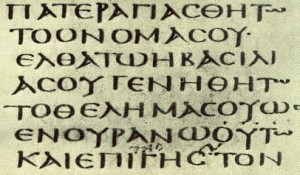From the First Letter to the Corinthians:
Do you not know that you are God’s temple and that God’s Spirit dwells in you? If anyone destroys God’s temple, God will destroy that person. For God’s temple is holy, and you are that temple.
(From the Daily Office Lectionary – 1 Corinthians 3:16-17 (NRSV) – November 27, 2012)
 Who is you? That’s not a grammatically incorrect question. It’s a deeply important question in our study and understanding of scripture.
Who is you? That’s not a grammatically incorrect question. It’s a deeply important question in our study and understanding of scripture.
Who is the “you” in these words from Paul’s first letter to the Church in Corinth? Is it the individual believer? Is it the church collectively? In English, it just isn’t clear and, thus, these verses are frequently misunderstood and wrongly preached. For example, I recently read a meditation by another American clergyman (from another denominational tradition) who wrote:
The Apostle says that the believer is a temple of God. This means that our bodies are sacred and belong not to ourselves, but to God. Given the gift of the Holy Spirit in our baptism and chrismation, we are to manifest holiness in our lives – in how we act and speak and think, in how we treat ourselves and in how we treat others. Our life is to be one of self-offering, our hearts and minds given over to the sacrifice of praise and worship and thanksgiving to God and loving sacrificial service to our neighbor.
While this writer may be correct that we are to demonstrate holiness in our lives and treat ourselves and others with respect, that is manifestly not Paul is speaking about in this letter! Paul is not saying “that the believer is a temple of God” and exhorting the individual to proper conduct. The “you” in these verses is not singular; it is plural.
In the koine Greek of the New Testament there were a singular “you” – su – and a plural “you” – humin. In these verses, Paul uses the latter. He is speaking of the whole body of the church as being the temple of God, not of the individual believer. Paul is addressing an issue of corporate solidarity, not individual holiness.
Our English language used to have these forms. “You” was the plural form; “thou” was the singular. Like in modern French, the plural “you” was also used as a formal singular, used with those one did not know personally or with superiors. “Thou” was reserved for familiar usage with intimate friends and family members. As modern English evolved, “thou” was dropped from everyday usage and “you” became the only form of the pronoun for all uses save one, worship. God continued to be addressed as an intimate friend.
Societies and their collective consciences change. Overtime, we came to understand “thou” as the formal word because we applied it only to God. When our Episcopal Church liturgy was modernized and “you” replaced “thou” in reference to God, one of the complaints about the contemporary English service was that it made God seem too familiar! In truth, that had already happened through the misreading of “you” in bible passages like today’s from First Corinthians.
Misunderstanding that “you” to be an individual and personal pronoun, like the clergyman I quoted above, American Christians had come to understand their religion as a “me and Jesus” affair, something highly personalized and individualized between the believer and God. Religion was privatized with each person having their own peculiar and idiosyncratic relationship with the Almighty. Nothing could have been more familiar to the believer than his or her own independent connection to God.
At the General Convention of 2009 our Presiding Bishop said that this is “the great Western heresy – that we can be saved as individuals, that any of us alone can be in right relationship with God.” She was roundly criticized by Evangelicals but, frankly, she was right. Her statement is still true. Throughout scripture there are singular “yous” and there are plural “yous” and the meaning and application of the text may hinge on knowing which was originally intended. Reading all of the “yous” in the scriptures as singular is not simply misinterpretation of language, it is misinterpretation of religion and that, by definition, is heresy. So, too, would be reading them all as plural!
When we read the bible we must get behind the words. The text was not originally written in English, so we cannot trust the English we read to be entirely accurate. We must look behind it to the original Hebrew or Greek. We must determine, for example, whether “you” is “all of you together” (humin) or “each of you individually” (su). We need to ask, “Who is you?”
====================
A request to my readers: I’m trying to build the readership of this blog and I’d very much appreciate your help in doing so. If you find something here that is of value, please share it with others. If you are on Facebook, “like” the posts on your page so others can see them. If you are following me on Twitter, please “retweet” the notices of these meditations. If you have a blog of your own, please include mine in your links (a favor I will gladly reciprocate). Many thanks!
====================
Father Funston is the rector of St. Paul’s Episcopal Church, Medina, Ohio.



Leave a Reply